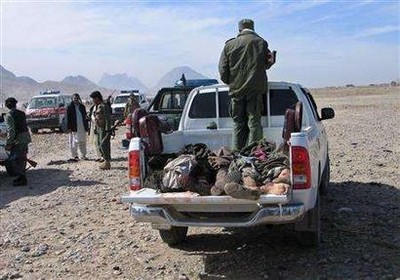By Allauddin Khan and Noor Khan
KANDAHAR - A suicide car bomber killed 38 Afghans at a crowded market Monday, pushing the death toll from two days of militant bombings to about 140.
The marketplace blast, which targeted a Canadian army convoy, came a day after the country's deadliest insurgent attack since a U.S. invasion defeated the Taliban regime in late 2001. The toll from that bombing in a crowd watching a dog fight rose to more than 100.

Bodies are loaded onto the back of a truck after a blast in Kandahar province February 17, 2008. A suspected suicide bomb attack at a picnic spot in the southern Afghan province of Kandahar on Sunday killed at least 60 people, and possibly as many as 80, the provincial governor said. (REUTERS/Ismail Sameem)
The back-to-back blasts in the southern province of Kandahar could be a sign insurgents are now willing to risk high civilian casualties while attacking security forces. Though their attacks occasionally have killed dozens, militants in Afghanistan have generally sought to avoid targeting civilians, unlike insurgents in Iraq's war.
"The attacks show that the enemies of Afghanistan are changing their tactics. Now they are not thinking about civilians at all," said Nasrullah Stanikzai, a professor of political science at Kabul University.
"They wanted to cause such big casualties in these attacks to weaken the morale of the government and the international community, to show the world the Afghan government is too weak to prevent them," he said.
NATO said it expects insurgents in Afghanistan turn more often to suicide bombings in the months ahead. The deployment of more troops into the insurgents' heartland has restricted their ability to hold territory and launch conventional attacks, said U.S. Army Gen. John Craddock, NATO's supreme commander, said at the alliance's headquarters in Belgium.
"I would expect that they will look for other ways to come back and it'll be irregular, asymmetric, it'll be with what is very sensational and resonates in the press and other places, that's the bombings," Craddock said.
The Taliban denied it carried out Sunday's attack, but immediately claimed responsibility for the market bombing, which took place in the town of Spin Boldak about 100 yards from the border with Pakistan.
The bombings come amid warnings that Afghanistan could see even more violence this year than in 2007, when a record 6,500 people _ most of them militants _ were killed. The U.S., with a record high 28,000 soldiers already in the country, is sending 3,200 more Marines in April.
Hours before the marketplace bombing, Kandahar Gov. Asadullah Khalid raised the toll from Sunday's attack from about 80 to more than 100, saying some of the dozens who suffered wounds had died.
Khalid said 38 people died in Monday's bombing and 28 were wounded. Three Canadian soldiers also had wounds, NATO's International Security Assistance Force said.
The governor complained that Canadian troops had failed to heed government warnings to stay away from the border with Pakistan.
"We informed the Canadian forces to avoid patrolling the border areas because our intelligence units had information that suicide attackers were in the areas and wanted to target Canadian or government forces," he said. "Despite informing the Canadians, they went to those areas anyway."
A Canadian military spokesman, Lt. Cmdr. Pierre Babinsky, said threats of attacks would not deter troops from their missions.
"We regularly receive threat warnings and obviously we go where we want to, when we want to, in our area of operation," Babinsky said. "We obviously take notice of these warnings but our aim is to operate freely within our area of operation despite those."
Though the Afghan-Pakistan border was closed Monday because of national elections in Pakistan, some of the wounded were taken to a hospital in Chaman, Pakistan, just across the border.
One of them, Abdul Hakim, lay in a hospital bed, his clothes caked with dust and splattered with blood.
"A white Toyota Corolla car rammed the second vehicle in the convoy as it passed through the bazaar," said Hakim, who witnessed the attack from his grocery store. "Then there was a huge explosion. It was dust. I do not know what happened to me."
One of the Canadian military vehicles was heavily damaged by the blast as were several shops and civilian vehicles, said Abdul Razeq, the Spin Boldak border police chief.
When asked about the large number of civilian deaths, Taliban spokesman Qari Yousef Ahmadi claimed 10 foreign soldiers and "a large number of police" were killed. The Taliban often make false or exaggerated claims that their attacks kill NATO or U.S. troops.
Meanwhile, Afghans buried relatives and friends who died in Sunday's attack. Officials said the attacker targeted an anti-Taliban militia leader, Abdul Hakim Jan, who died along with 35 of his men, who served on a government auxiliary police force.
Khalid, the Kandahar governor, told mourners at a mosque he had warned Jan about three weeks ago that militant suicide bombers were trying to kill him. Government officials haven't identified any suspects in the attack.
Antonio Giustozzi, an Afghanistan expert at the London School of Economics, said it couldn't be ruled out that the attack was carried out by one of Jan's tribal rivals.
Kandahar province, the Taliban's former stronghold, has been the scene of fierce battles between NATO forces and Taliban fighters the last two years.
The province, one of the country's largest opium-producing regions, could again be a flash point in the increasingly violent Afghan conflict this year.
The previous deadliest bombing in Afghanistan killed about 70 people _ mostly students _ in November, part of a record year of violence in 2007 that included more than 140 suicide attacks.



